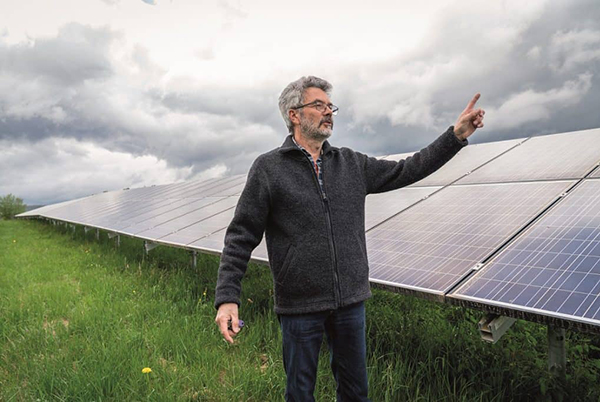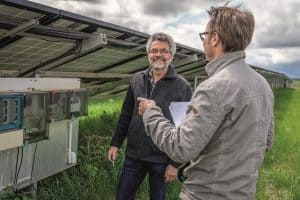Citizen Energy for Clean Power
by Peter Wark | 23.09.2020

Eco-energy in and from the hands of citizens: this concept of citizen energy is followed, especially in Germany, by many cooperatively organized people who are committed to the energy transition and regional value creation. The so-called citizen energy cooperatives or energy cooperatives offer citizens the option of actively participating in the energy transition and helping to shape it.
Energy from Citizens, for Citizens
One example is the "Bürgerenergiegenossenschaft Schwarzwald". With 220 members, it operates an open-space plant near the town of Alpirsbach in the northern Black Forest, along with several other projects. The bare figures of the "Solarpark Peterzell" alone are impressive: 880 kilowatts of installed capacity on an area of 6000 square meters, 3600 modules with a nominal output of about 250 watts each, investment costs of almost one million euros. A Solar-Log™ 2000 is in use for the energy management of the PV plant.
900,000 Kilowatt Hours of PV Electricity per Year
It was a real tour de force to build this plant on the landfill site, recalls Ulrich Seiz, a member of the six-member cooperative board. Together with the operator of the landfill, which is still in use, and a large coalition of the willing citizens, neighbors, local politicians, banks, etc., they tackled the large project. The PV system has been reliably generating electricity since summer 2013. The targeted annual yield of 900,000 kilowatt hours "is usually easily achieved," says Ulrich Seiz. The large plant on the landfill itself feeds completely into the grid; in principle, the Black Forest residents market their electricity via the nationwide "Bürgerwerke" network.
Bureaucracy is a Major Obstacle
Difficulties with such a large PV system are not so much of a technical nature, the 6688 environmental engineer and building biologist knows, even though there have already been problems with several of the 32 inverters. Many of the volunteer comrades tend to lose interest because of a large administrative burden. Often frustrating bureaucratic obstacles and sometimes absurd regulations that still slow down renewable energy. "We'd like to try a lot more, but we're not legally allowed," laments the board member responsible for local energy and e-mobility. "Legally, we are treated like any Volksbank," says Ulrich Seiz. From a share of 100 euros to a maximum of 15,000 euros, anyone interested can become a member of the cooperative. This distributes on average 2 to 3 percent dividend.
The Future of Citizen Energy
Ulrich Seiz and his comrades-in-arms are currently dealing with a concrete animal problem. Until now, a shepherd let his animals graze on the site, but the living lawnmowers are no longer there, and the green under the module surfaces is sprouting. There are fewer and fewer shepherds in the Black Forest, too. Mowing the lawn by hand? Hard to imagine with 15,000 square meters of land. Against all odds, the advocates of a more environmentally friendly energy future are constantly planning new projects, in some cases in cooperation with local authorities. The money generated is reinvested in environmentally friendly power generation. Says Seiz, "We're always looking for rooftops." Meanwhile, the cooperative operates projects with a total output of 1 megawatt.
Against the apparently again current plans of the federal net agency in Germany to force in principle PV old plants into the feed, the energy cooperatives "very clearly to the defense will set themselves", announces Seiz. Every kilowatt hour of electricity generated by renewable energies avoids the burning of environmentally harmful coal, gases, and oils. This is worth fighting for, also in the context of citizen energy.
Back to the overview


